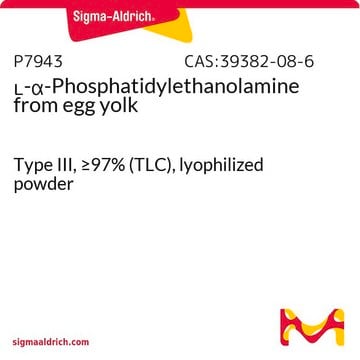P7769
1,2-Diacyl-sn-glycero-3-phospho-L-serine
from bovine brain, ≥97% (TLC), amorphous powder, structural phospholipid
Sinónimos:
3-sn-Phosphatidyl-L-serine, L-α-Phosphatidyl-L-serine, PS, Phosphatidylserine
About This Item
Productos recomendados
product name
1,2-Diacyl-sn-glycero-3-phospho-L-serine, ≥97% (TLC), from bovine brain, amorphous powder
biological source
bovine brain
Quality Level
assay
≥97% (TLC)
form
amorphous powder
storage temp.
−20°C
¿Está buscando productos similares? Visita Guía de comparación de productos
Application
- as a lipid standard in time-of-flight secondary ion mass spectrometry (ToF-SIMS) spectral fingerprints
- as a reference standard in thin layer chromatography (TLC) for quantifying lipids from astrocyte-conditioned media (ACM) treated fibroblasts
- as a component of large unilamellar vesicles for annexin A2 aggregation studies
Biochem/physiol Actions
Features and Benefits
Caution
Storage Class
11 - Combustible Solids
wgk_germany
WGK 3
flash_point_f
Not applicable
flash_point_c
Not applicable
ppe
Eyeshields, Gloves, type N95 (US)
Certificados de análisis (COA)
Busque Certificados de análisis (COA) introduciendo el número de lote del producto. Los números de lote se encuentran en la etiqueta del producto después de las palabras «Lot» o «Batch»
¿Ya tiene este producto?
Encuentre la documentación para los productos que ha comprado recientemente en la Biblioteca de documentos.
Los clientes también vieron
Artículos
Discover Bioactive Small Molecules for Lipid Signaling Research
Discover Bioactive Small Molecules for Lipid Signaling Research
Discover Bioactive Small Molecules for Lipid Signaling Research
Discover Bioactive Small Molecules for Lipid Signaling Research
Nuestro equipo de científicos tiene experiencia en todas las áreas de investigación: Ciencias de la vida, Ciencia de los materiales, Síntesis química, Cromatografía, Analítica y muchas otras.
Póngase en contacto con el Servicio técnico






